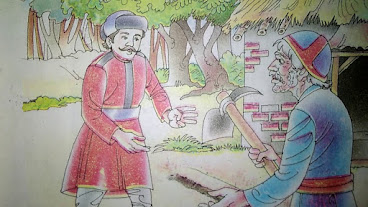A Mad Tea Party
chapter 4. Class7th
Tulip Series
A Mad Tea Party
Introduction
Alice becomes a guest at the “mad” tea party along with the March Hare, the Hatter, and the very tired Dormouse, who often falls asleep, only to be violently woken up moments later by the March Hare and the Hatter. The characters give Alice many riddles and stories, including the famous ‘Why is a raven like a writing desk? ‘. The Hatter reveals that they have tea all day, because Time has punished him by standing still forever at 6 p.m. (tea time). Alice gets insulted and tired of being bombarded with riddles and leaves claiming that she was the stupidest tea party she’d ever been to.
A Mad Tea Party Summary
Alice approaches a large table set under a tree outside the house of March Hare and comes across the Mad Hatter and the March Hare taking tea. They rest their elbows on the sleeping Dormouse who sits between them. They’re telling Alice that there’s no room at the table for her, but Alice is still sitting there. The March Hare is offering Alice wine, but there is none. Alice tells the March Hare that his behaviour is uncivil, to which he adds that it was uncivilised for her to sit down without being invited. The Mad Hatter enters the conversation, saying that Alice’s hair “wants to cut.” Alice admonishes his rudeness, but ignores her scolding and answers with a riddle: “Why is a raven like a writing desk? Alice tries to answer the riddle, which starts with a big semantic argument. The tea party sits in silence after their argument, until the Mad Hatter asks the time for the March Hare. The Mad Hatter becomes angry when he discovers that the March Hare’s watch, which measures the day of the month, is broken. He blames the March Hare when the March Hare was spreading butter on it for getting crumbs on the watch. The March Hare dips the watch in his tea sullenly, remarking dejectedly that “It was the best butter.”
Alice gives up on the riddle and gets upset with the Mad Hatter when she learns that he doesn’t know the answer either. She tells him that he doesn’t have to waste time asking for riddles that have no answers. The Mad Hatter calmly explains that Time is a “him,” not a “it.” Since the Queen of Hearts said the Mad Hatter was “murdering time” when he performed a song badly, he goes on to recount how Time has been upset. Since then, time has remained fixed at six o’clock, which means that perpetual tea-time exists. The March Hare states, bored with this line of conversation, that he wants to hear a storey, so the Dormouse wakes up. The Dormouse tells the storey of three sisters living in a treacle-well, eating and drawing treacles. Alice, confused by the tale, interjects with so many questions that the Dormouse is offended. Alice continues asking questions until she is insulted by the Mad Hatter and she storms off in disgust. She looks back at the Mad Hatter and the March Hare as she walks and as they try to stuff the Dormouse into a teapot.
Alice encounters a tree in the wood with a door in it. She enters the door and finds herself back in the big hall. Alice goes back to the key table and uses the mushroom to grow to the size that she can reach the key, then to shrink back to the size that she can fit through. She goes through the door and finally arrives at the passageway to the garden.
Working With the Text | Questions Answers
(A) Answer these questions:
Q. 3. Alice and March Hare considered each other impolite.
b) In what way was Alice impolite?
Ans. Alice joined the party without being invited by the animals. In this way, she was impolite .
Q. 4. What were the two points, which puzzled Alice in the story of the Dormouse?
Ans. The two points that puzzled Alice are as follows:
1. that the sisters were living in the honey well,
2. that they were learning to draw the honey and everything that begins with an M, out of honey-well.
Q. 5. Why did Alice leave the party?
Ans. Alice left the party because she could not bear the rudeness of Hatter and March Hare anymore.
(B) Say whether the following statements are True or False:
Language Work:
Find at least five Wh-questions and five Yes/No questions from the story and write them down in the space provided:
Wh-questions:
1. Why did they live at the bottom of the well?
2. What did they draw?
3. Where did they draw the honey, from?
4. What did they live on?
5. Who is making personal remarks now?
Yes/No questions
3. Do you need some money?
4. Are coming to my home tomorrow?
5. Shall we go on a picnic after two days?
Grammar Work:
Use the verbs in the correct form (past continuous and simple past) to make meaningful sentences.
1. Javid was waiting (wait) for me when I arrived (arrive).
2. What were (be) you doing (do) this time yesterday?
3. My friend took (take) a photograph of mine while I was looking (look) at the flowers.
4. We were in a very difficult position. We did not know (not/know) what to do.
5. I haven’t seen Geeta for ages. When I last saw (see) her, she was trying (try) to find a job in Srinagar.
6. She burned (burn) her hand when she was cooking (cook) dinner.
7. I saw (see) you in the park yesterday. You were sitting (sit) on the grass and reading a book.
8. While Rahim was working (work) in the garden, he hurt (hurt) his back.
9. When I was (be) young, I wanted (want) to be a doctor.




